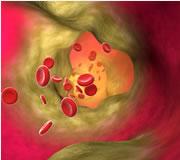 This computer rendition shows how fatty deposits can narrow blood vessels.© SPL
This computer rendition shows how fatty deposits can narrow blood vessels.© SPLA compound derived from the cannabis plant protects blood vessels from dangerous clogging, a study of mice has shown. The discovery could lead to new drugs to ward off heart disease and stroke.
The compound, called delta-9-tetrahydrocannabinol (THC), combats the blood-vessel disease atherosclerosis in mice. This disease occurs when damage to blood vessels, by nicotine from cigarettes, for example, causes an immune response that leads to the formation of fatty deposits in arteries.
These deposits form because the immune cells can linger too long, recruiting others and leading to an inflamed blockage that snares fatty molecules. The disease is the leading cause of heart disease and stroke in the developed world.
THC seems to tone down this immune response, report François Mach of the University Hospital Geneva, Switzerland and his colleagues. The compound binds to a protein called CB2 that is present on the surfaces of certain immune cells.
Block buster
Mach's team administered tiny amounts of pure THC to mice. The treatment reduced the progression of blood-vessel blockage formation by more than one-third, the researchers report in this week's Nature1.
Furthermore, feeding the mice a compound that interferes with binding to CB2 abolished the therapeutic effect of THC. This proves that the process involves the CB2 protein rather than a similar protein called CB1, which is found on cells in the brain and nervous system and is responsible for cannabis's psychological effects.
“This paper has nothing to do with smoking marijuana.”
François Mach
University Hospital Geneva, Switzerland
The benefits for atherosclerosis occurred only at a certain dosage, Mach adds. At higher and lower doses, THC has no therapeutic effect on blood vessels, he says. He notes the similarly moderated effects of alcohol on heart disease, adding that a single glass of Bordeaux may reduce risk while overindulgence can increase it.
The team also emphasises that the THC dose required to protect blood vessels is lower, relative to body weight, than that which would produce the mind-altering altering effects of cannabis in humans. "This paper has nothing to do with smoking marijuana," Mach stresses.
"It does not mean that smoking cannabis is beneficial to the cardiovascular system, as cannabis smoke contains many toxins which may actually lead to cardiovascular diseases," says Michael Randall of the University of Nottingham Medical School, UK, who has studied cardiovascular disease and cannabinoids.
"The body also produces its own cannabis-like chemicals and whether they may play a role in the above beneficial effects is unclear," he adds.
Future drugs
THC could be deployed alongside currently used cholesterol-controlling drugs called statins to fight atherosclerosis, Mach suggests. "I don't think this will replace statins. But we may add another compound that will fight against inflammation," he explains.
ADVERTISEMENT
Because THC might suppress the immune system in a general way, there is a danger that it may harm the body's ability to fight infection. To avoid this, Mach says, it may be necessary to identify similar compounds that specifically target the CB2 protein.
Still, the discovery adds to the range of potential medicinal benefits of cannabis compounds. Besides its well-publicized use for pain relief, the drug is also given to anorexics to stimulate appetite, and cancer patients to combat the nauseating side-effects of chemotherapy.
University Hospital Geneva, Switzerland
-
References
- Steffens S., et al. Nature, 434. 782 - 786 (2005). | Article |
